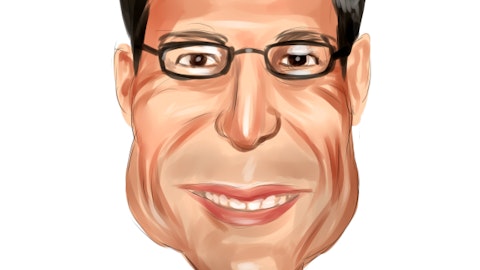Micron Technology, Inc. (NASDAQ:MU) has started the day on a positive note, as its shares are up by nearly 12% in morning trading to $19.70. The shares of the semiconductor company rallied after a Chinese state-owned company showed intent to buy Micron, making an offer for it this morning, though a rather weak one all things considered, and one that seems unlikely to be accepted. Tsinghua Unigroup Ltd., a Beijing-based firm offered $21 per share, which puts the value of the semiconductor company at $23 billion. While discussing the bid, Zhao Weiguo, chairman of Tshinghua Unigroup, said, “We are very interested in cooperation with Micron.”

Charles Knowles / Shutterstock.com
However, some market experts are calling it a long shot backed by a low-end offer. According to the experts, Micron Technology, Inc. (NASDAQ:MU) has a much higher long-term value and the board is unlikely to consider this offer, which offered a limited premium on yesterday’s closing price (far lower than what most transactions go for), and actually values the company at less than what it was trading at less than a month ago. Further, analysts suspect regulatory concerns over the deal and a Chinese takeover, considering that it is the only US company manufacturing DRAM chips, is unlikely to happen. In case this deal materializes in the future, this would be the largest takeover by a Chinese company in the United States. Interestingly, Intel Corporation (NASDAQ:INTC) bought a 20% stake in Tsinghua Unigroup last September for $1.5 billion.
Sundeep Bajikar of Jefferies called it an undervaluation of the company while projecting an improvement in Micron Technology over the next year and a half. He said, “Such a bid would be consistent with our thesis that 1) MU is deeply undervalued at current levels, 2) DRAM and 3D NAND manufacturing technologies are strategic for China but difficult to access, and 3) Micron’s technology positions in DRAM and NAND (esp. 3D NAND) are likely to improve significantly over the next 12 to 18 months.” Bajikar was another expert to mention regulatory concerns over the deal. The analyst further added that the selling witnessed in Micron Technology, Inc. (NASDAQ:MU)’s shares is a result of panic selling and the shorter investment focus maintained by those investors who sold.
In terms of long-term valuation, Micron Technology has the support of hedge fund investors such as David Einhorn, manager of Greenlight Capital, who expressed his strong views and support for the company in a letter to the funds’ investors yesterday. While discussing both Netflix Inc (NASDAQ:NFLX) and Micron Technology, Inc. (NASDAQ:MU), he mentioned that “we don’t think the movie is over.” What was even more surprising was Einhorn indicating that he expects the latter to be valued higher than Netflix over the next few years. One of the primary reasons pushing optimism of Micron Technology is the bright future of DRAM and NAND, which has been the primary focus of the company over the past few quarters. At the end of the first quarter, Greenlight Capital had 33.55 million shares of Micron Technology, Inc. (NASDAQ:MU) in its portfolio, valued at $910.20 million. Andreas Halvorsen’s Viking Global is another hedge fund heavily invested in the company, owning 31.15 million shares with a market value of $844.99 million at the end of the first quarter. It is important to note that the shares of Micron Technology have declined by 30% in the second quarter and by 45.56% year-to-date.
Follow David Einhorn's Greenlight Capital
At Insider Monkey, we track hedge funds’ moves in order to identify actionable patterns and profit from them. Our research has shown that hedge funds’ large-cap stock picks historically delivered a monthly alpha of six basis points, though these stocks underperformed the S&P 500 Total Return Index by an average of seven basis points per month between 1999 and 2012. On the other hand, the 15 most popular small-cap stocks among hedge funds outperformed the S&P 500 Index by an average of 95 basis points per month (read the details here). Since the official launch of our small-cap strategy in August 2012, it has performed just as predicted, returning over 135% and beating the market by more than 80 percentage points. We believe the data is clear: investors will be better off by focusing on small-cap stocks utilizing hedge fund expertise rather than large-cap stocks.
Disclosure: None





